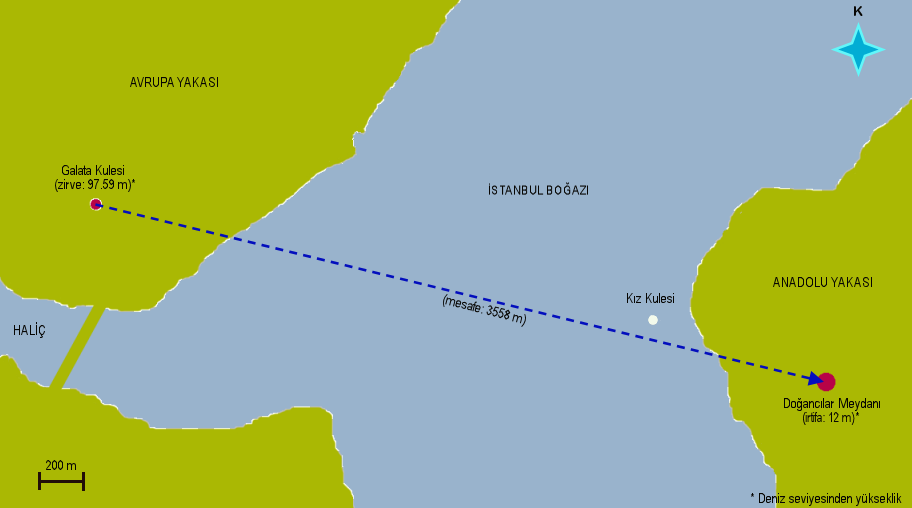First flying man
Hezarfen Ahmet Çelebi(First flying man)
 Hezarfen Ahmet Celebi (1609-1640), an inhabitant of Istanbul in the 17th century Ottoman Empire is credited with the first appropriate flight with artificial wings in the history of aviation. The event took place in the year 1638 during the tenure of Sultan Murad IV. Hezarfen took off from the 183-foot tall Galata Tower near Bosporus and landed successfully at Uskudar, on the other side.
Hezarfen Ahmet Celebi (1609-1640), an inhabitant of Istanbul in the 17th century Ottoman Empire is credited with the first appropriate flight with artificial wings in the history of aviation. The event took place in the year 1638 during the tenure of Sultan Murad IV. Hezarfen took off from the 183-foot tall Galata Tower near Bosporus and landed successfully at Uskudar, on the other side.

This feat was 200 years ahead of its time. Evliya Celebi, historian and chronicler and an eyewitness, recorded vividly in his Seyahatname (a book of travel), the jubilation that followed. Sultan Murad IV was inordinately pleased. Hezarfen was awarded a thousand gold pieces.
 He was bound for greater glory when religious intolerance and political asininity cut him down. Palace advisors and religious heads forced Sultan Murad to do otherwise. Hezarfen was exiled to Algeria. (In this irony of fate, he had another illustrious contemporary as company. Galileo had been sentenced for life and put under house arrest in 1633 for unmitigated brilliance that religion and politics found hard to digest.)
He was bound for greater glory when religious intolerance and political asininity cut him down. Palace advisors and religious heads forced Sultan Murad to do otherwise. Hezarfen was exiled to Algeria. (In this irony of fate, he had another illustrious contemporary as company. Galileo had been sentenced for life and put under house arrest in 1633 for unmitigated brilliance that religion and politics found hard to digest.)
After two years Hezarfen died. He was thirty-one.
Hezarfen Ahmet Celebi is an unforgettable name. His trials and tribulations have the shadow of genius. Hezarfen airstrip-one of the three airports in Istanbul-is a reminder that dreams do not die
This feat was 200 years ahead of its time. Evliya Celebi, historian and chronicler and an eyewitness, recorded vividly in his Seyahatname (a book of travel), the jubilation that followed. Sultan Murad IV was inordinately pleased. Hezarfen was awarded a thousand gold pieces.
 He was bound for greater glory when religious intolerance and political asininity cut him down. Palace advisors and religious heads forced Sultan Murad to do otherwise. Hezarfen was exiled to Algeria. (In this irony of fate, he had another illustrious contemporary as company. Galileo had been sentenced for life and put under house arrest in 1633 for unmitigated brilliance that religion and politics found hard to digest.)
He was bound for greater glory when religious intolerance and political asininity cut him down. Palace advisors and religious heads forced Sultan Murad to do otherwise. Hezarfen was exiled to Algeria. (In this irony of fate, he had another illustrious contemporary as company. Galileo had been sentenced for life and put under house arrest in 1633 for unmitigated brilliance that religion and politics found hard to digest.)After two years Hezarfen died. He was thirty-one.
Hezarfen Ahmet Celebi is an unforgettable name. His trials and tribulations have the shadow of genius. Hezarfen airstrip-one of the three airports in Istanbul-is a reminder that dreams do not die


Comments
Post a Comment